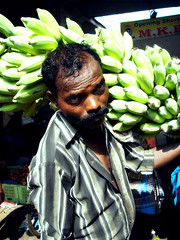A roadside stand is a poem written by the highly-acclaimed poet, Robert Frost who is regarded for his realistic depiction of rural life using which he touched several difficult social themes of the time.
In this poem, the poet highlights the plight of the deprived villagers who are aching for some money to lead a prosperous life. The poet is also very critical of the way the city folks treat these villagers who are selling their locally produced goods and whizzing past them without a sense of empathy.
Lines 1-6
The occupants of the little old house have extended the shed in front, around the edge of the road where traffic passes by. Though it would be unfair to state that the shack-owners wanted a charity of bread, but nevertheless they seemed to implore the passers-by to stop and buy something from the shack. These deprived people long for the feel of the currency, the circulation of which flourishes the city folks.
Lines 7-15
But unfortunately, the refined traffic whizzed past, unmindful of the shack. Or, if by chance, any stopped, it would be with a feeling of reproach at this blot on the picturesque landscape. They are very perturbed to see the unimpressive and toppled up signboards. The shack offered for sale wild berries in a wooden quart (quarter of a gallon). The unqualitative local produce is highlighted with the usage of words like "crook-necked", "squash with silver warts".
The place also offered a blissful stay in the lap of nature for the ones who had money. Angry at the callous attitude of the so-called ‘polished traffic‘, the poet commands them to move ahead oblivious of the road-side stand.

A villager at a roadside stand
Lines 16-22
The poet’s concern is not about the blemish on the landscape but regarding the unvented sorrow of the shed-owners. Expressing the view point of these people, the poet converts their ardent desire to handle some city money, which may perhaps alleviate their sufferings as sometimes promised in movies. The political party in power actually deprive them of a prosperous life.
Lines 23-31

Villager
The poet quotes the news which highlights the evacuation and relocation of the poor villagers to the vicinity of the theaters and the shops. Tall promises have been made to take good care of them. Outraged at the negligent attitude of the civic authorities, government and even social service agencies, the poet addresses them as "greedy good-doers" apparently benefactors but actually "beasts of prey" who exploit the innocent village folk by giving them a short term sense of security, the villagers are not being helped but harmed.
They pay a heavy price by losing their land. These developers, civic authorities, with a calculative strategy "soothe" (silence) and befool the unalloyed heart and minds of these villagers. By ensuring them a better life and hence good sleep, they actually sleep peacefully themselves and destroy their slumber with anxiety. In the ancient way, people used to work during day and sleep in nights which has been reversed here where they are not able to sleep at night because they haven’t worked in the day.
Lines 32-43
The poet is distressed to note the interminable wait on the part of the shed owners for their prospective buyers, he calls it almost a "childish longing in vain". The shop window is blanketed with an ambience of sadness that surrounds expectancy. It seems these people yearn for the sound of the car brakes near the shack.
One of the "selfish cars" that pass by the shed has perhaps halted to enquire the "farmer’s price" while the other just wanted to use the backyard to turn. It’s indeed a satire that one of the occupants of the car stops at the shed to get a gallon of gas. It highlights a sense of alienation that exists between the rural and urban life. Unaware of the villagers plights and engrossed with the pleasure of the material world, these people are unable to gauge the glaring difference in city and rural life.
Lines 43-52
The poet regrets that the yardstick of gain vested in money, isn’t found in the country-side at all. Money he feels elevates spirits and the lack of it dampens the villagers’ perspective towards life. They tend to express their grievance about a life bereft of money. At this point of time, the poet is overwhelmed with emotions and contemplates their pain at one go by changing their lives. But a later logical thought and a poised state of mind tells him the futility of this rash act. It might compel him to seek purgation of pain from others for his thoughtless decision.

